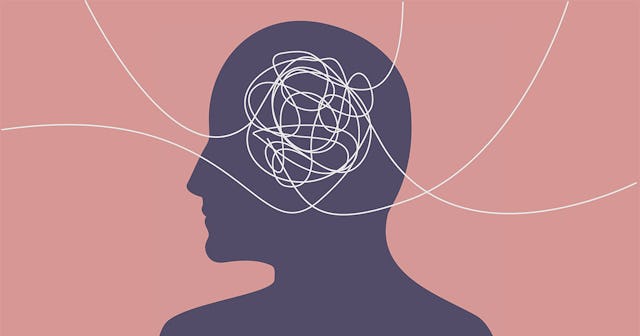There's Neurological Evidence to Support A Link Between ADHD And Autism

Most of us probably think we know all about ADHD and autism. Kids with ADHD are hyper; kids with autism have social problems. Right? Easy-peasy. They’re separate disorders.
But consider this.
My husband has severe ADHD. He also has an encyclopedic knowledge of J.R.R. Tolkien. This isn’t a case of “my husband speaks Elvish” (oddly, that’s the one thing he doesn’t do, but when I point it out he gets huffy and says he can read enough to decode it, thanks, he doesn’t need to speak it). Instead, my husband can deliver an extended discourse on Tolkien’s hatred of romance languages and his desire to eradicate all French-based words from his works, hence “cul-de-sac” translates to “Bag-End.” He can trace complex genealogies of Middle Earthlings, explain the basics of “lost” Middle Earth myths (“See, like how Beowulf refers to all these sagas we’ve lost, that’s what Tolkien’s doing when he mentions…”), and expound upon why The Lord of the Rings cannot be fully understood outside the context of The Silmarillion.
He often raves at length about his obsessions (he’s just as into fossils as he is Middle Earth),
I also have severe ADHD. My extreme obsession isn’t The Lord of the Rings but The Magicians, both the books by Lev Grossman and the TV show produced by Sera Gamble and John McNamara. I own original wardrobe and set pieces. I can recite dialogue. I have many, many T-shirts. My Facebook profile photo is not me, but character Alice Quinn.
But not only do I have an extreme obsession, I also have major problems with social interactions: conversational turn-taking remains elusive, for example; I have trouble reading other people’s social cues and sometimes their emotions. I tend to use obsessive behaviors as coping mechanisms.
Both my husband and I, significantly, have inattentive ADHD.
ADHD And Autism Overlap Significantly
Of course, attention deficit hyperactivity disorder and autism spectrum disorder are two separate disorders. We all know that ADHD involves “impaired functioning in the areas of attention, hyperactivity, and impulsivity,” according to one study in Frontiers in Neuroscience, while autism spectrum disorder is characterized by “social dysfunction and restrictive-repetitive behaviors.” However, these same researchers estimate that 30-50% of those with ASD show ADHD symptoms (other studies give the numbers as high as 30-80%), and a full two-thirds of those with ADHD exhibit symptoms of ASD. In other words, ADHD and autism symptoms overlap significantly.
The same study shows that ADHD and autism, moreover, both usually include problems with attention, “communication with peers, impulsivity, and… restlessness or hyperactivity.” Many people with ADHD also show the same obsessive tendencies that those with autism exhibit; they also have the same difficulties reading emotion and participating in social situations.
The diagnoses occur together so often, and exhibit so many of the same symptoms, in fact, that one team from the Netherlands proposed they were different varieties of the same disorder. “Are we looking at one condition that’s on a continuum, or two distinct conditions? I think we don’t know the answer to that question,” Geraldine Dawson, director of the Duke Center for Autism and Brain Development told Scientific American.
There’s Neurological Evidence to Support A Link Between ADHD And Autism
Maskot/Getty
A JAMA Psychiatry Study published in 2017 examined the brains of children with ADHD and autism. To simplify: they measured neural connectivity in the kids’ white matter. No matter what the child’s diagnosis, there were “associations” between autism symptom severity and “abnormalities in white matter organization.” The same issues were found in kids with inattentive ADHD — but not hyperactive ADHD.
Science Daily reports that a Danish study found ADHD and autism share changes in the same genes. “The very fact that mutations are found to the same extent and in the same genes in children with autism and in children with ADHD, points towards the same biological mechanisms being involved,” Anders Børglum, professor at Aarhus University and one of the study’s main researchers, told Science Daily. Changes in this particular gene increases a person’s risk of developing ADHD and autism by more than 15 times.
Another study found that there’s “a substantial overlap in functional brain connectivity between ADHD and autism.” So the brains of those with autism and ADHD tend to work in the same ways. And while they’re certainly different disorders, the overlap is remarkable.
So What Does This Mean?
Number one: a lot of kids diagnosed with autism are also diagnosed with ADHD, and vice-versa.
Number two: it’s often hard to tell if a kid has ADHD, autism, or both. I personally show many of the characteristics of autism spectrum disorder: I’m not great at the using nonverbal communications, like “eye contact, body language, and social expressions.” Many times, I suck at “the social give-and-take of friendship.” I tend towards “narrow interests abnormal in intensity and focus”; I show “stereotyped repetitive motor mannerisms.” As a child, I exhibited more signs of ASD.
Number three: it’s important to have kids who are diagnosed with one disorder evaluated for the other.
I know several people with severe ADHD who’ve been told they’re close to ASD. I also know many people with ASD who also exhibit symptoms of ADHD. So it’s important for parents to be aware of the disorders’ comorbidity and act accordingly. Are they the same disorder? The jury is still out, but there is definite overlap in behavior, brain chemistry, and genetics.
Whatever you believe, it’s important to be aware that the two disorders often occur together. Make sure your kid’s doctor can parse out their differences. And perhaps make sure your own doctor can parse out the differences between ADHD and autism as well.
This article was originally published on